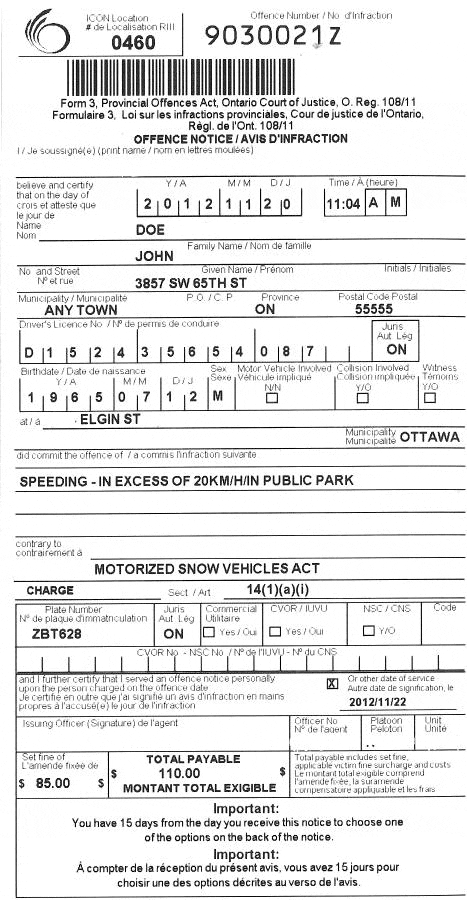Fighting Speeding Tickets
Can You Fight a Speeding Ticket?
Why Fight Your Ticket
Speeding tickets have more penalties than just a fine, such as:
- demerit points
- licence suspensions
- insurance increases
- employment implications
Where the driver disputes the ticket, the ticket does not go on the driving record or insurance until after any court date or when a conviction is registered at the court.
Court System Delays
Many times court dates are delayed months and even years.
As of date of writing, many traffic tickets have been in limbo since March of 2020. Where the driver has asked to dispute the ticket by applying for a court date or trial date, the effect is:
- the ticket is delayed from,
- going to the insurance
- going on your driving record
- reduces or removes any demerit points
- reduces the affect on insurance rates
- may avoid any licence suspensions
- can reduce or save/cancel the fine
If you need professional advice OntarioSpeeding recommends OTT Legal Services.
Speeding & Insurance
Where the driver has told the court that they wish to fight or dispute the ticket, the ticket does not go on the driving record until the case has completely gone through the court system.
While the speeding ticket is being disputed then, the ticket is NOT on the driving record.
Any insurance implications and demerit points are also delayed until AFTER any court date.
Many court dates have been known to be months away and dates over 1 year are not uncommon for some traffic ticket courts.
Disputing any traffic ticket or speeding ticket keeps the ticket away from the insurance until the next renewal date. For example:
- insurance is set to renew in April
- driver receives a speeding ticket in February
- driver requested a trial date
- the trial date was set for June
- subsequently the ticket was not on the driver’s record for the insurance renewal in April
- insurance record is clear on renewal date
- as no conviction has been registered
- as the ticket is “awaiting” trial
- as no conviction has been registered
- insurance record is clear on renewal date
In this example, whether the driver ultimately wins the ticket or not the driver avoids the insurance “seeing the ticket” until the next years renewal.
Fighting Your Speeding Ticket
In legal terms a speeding ticket is called a “Strict Liability Offence“, which means that the prosecution does not have to prove:
- why, or that you meant to speed, or intended to speed
- only that the driver was speeding
In traffic court the prosecution does NOT have to prove that you intended to speed or that you intentionally were speeding.
All the police and prosecution have to prove in strict liability offences is that you committed or “did the act”.
The driver is always legally responsible for the speed of their vehicle.
Explanations are not Defences
You cannot defend yourself by saying you:
- didn’t intend to speed,
- you had no intent to speed or
- that you had a reason to or,
A driver cannot come to traffic court and make a defence for speeding by saying it was a mistake, error or give an explanation.
Explanations, explaining why the driver did the act are not defences to speeding.
Two (2) Defences to Speeding
There are 2 legal defences to speeding:
- rushing someone to the hospital
- to save their life,
- when it is impracticable to,
- call an ambulance or police
- when it is impracticable to,
- to save their life,
- imminent fear for your life
- you actually speeding to go to a place of safety,
- e.g. driving to the police station
- you actually speeding to go to a place of safety,
Speeding to take care of someone in need of medical attention means that:
- the driver was speeding in order to take someone to a medical facility,
- where no other reasonable means of transportation was available and
- the emergency was life threatening.
Imminent fear for your life means that:
- the driver was in actual fear for their life, and
- that they were speeding to get to a place of safety
- when no other means was available.
This includes speeding to get to the police station or another place they would be protected from the threat, but does not include rushing to get home or other similar place.
The driver must have been speeding to get to a known place of safety e.g. a police station
Speeding Ticket Trials
Speeding ticket trials are won on:
- the officers evidence
- cross-examinations of witnesses
- legal technical arguments, e.g.
- errors on speeding tickets
- Charter applications
- legal applications of the law
Legal Technicalities
Besides the two legal defences to speeding the prosecution must prove the case to the court beyond a reasonable doubt, and without errors, for example:
- is the officers name “printed” at the top of the ticket
- is the date of offence and time proper
- is the driver properly identified on the ticket
- is the location and municipality properly specified
- is the offence specified properly
- is the section number and Highway Traffic Act on the ticket
- is the fine the correct amount
- did the officer sign the ticket
Many of these issues are considered the essential elements of the charge that the prosecution must prove to convict a driver of speeding. Where the information is lacking, in error and not provided to the judge, the judge may dismiss the charge.
Police Officers Evidence
In a trial for speeding the police officer will first take the stand. The officers job is to explain to the judge the “Who What Where When and How”.
The officer must explain to the justice how they recorded the driver speeding. The officer must tell the court:
- I was stopped on King St for the purpose of conducting speed enforcement
- the posted speed at this location is 60km/h
- I was using a police radar that was working properly
- I observed a brown car that appeared to be speeding
- I activated the radar device and recorded a speed of 80km/h
- I stopped the driver who identified themselves with an Ontario drivers licence
- I issued that person a ticket for the offence before the court
This evidence is called the police officer’s “evidence in chief”.




